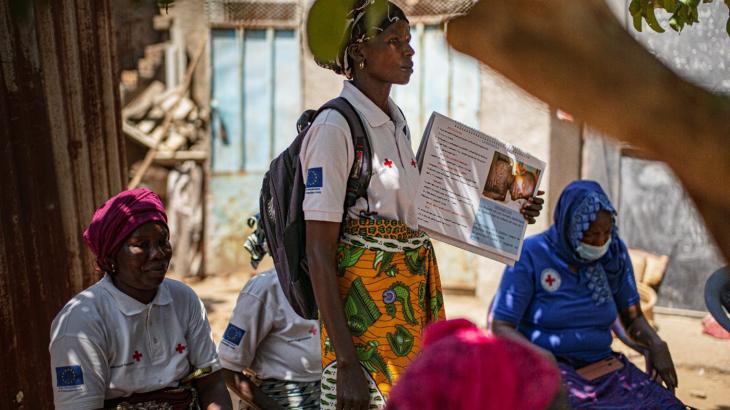Target areas: Health areas of Bongor Urbain 1, Bongor Urbain 2, Bongor Sièké, Maguine, Biliam-oursi. Djoumane, Doroti, Kerfi
Period: October 2021 to March 2022: pilot phase. April 2022 to June 2025: Project implementation
Context: Preparedness
Data collection system: CBS register for data collection by volunteers, centralized Excel database at the project level for centralizing collected data.
Health events monitored:
- Bongor: measles, yellow fever, COVID-19, poliomyelitis/PFA, Guinea worm, and mpox
- Goz Béida: hepatitis E, tetanus, cholera
Project: ECHO programmatic partnership
Partners: Mayo Kébbi East Governorate, Sila Governorate, Mayo Kébbi East Provincial Delegation, Sila Provincial Delegation, Bongor District, Goz Béida District, Head of Health Centers, Provincial Regional Territorial Council of East Mayo Kébbi, Provincial Regional Territorial Council of Sila
CBS in Chad
Community-Based Surveillance (CBS) was implemented in the district of Bongor (and partially in Goz Béida) as part of the Programmatic Partnership project funded by DG ECHO. This system aimed to strengthen early detection and rapid response to epidemics at the community level. The Chad Red Cross played a central role through the involvement of its 120 trained volunteers in the district of Bongor East and 80 in Goz Béida. These volunteers, in conjunction with community health workers, collected and transmitted health alerts, raised awareness among the population, and liaised with health facilities.
The French Red Cross provided technical support for CBS coordination, structures surveillance mechanisms, and assisted with monitoring activities. CBS was operational in eight health areas, including six in Bongor (Bongor Urbain 1 and 2, Bongor Sièké, Maguine, Biliam-Oursi, Djoumane) and two in Goz Béida (Doroti, Kerfi).
Diseases monitored varied by district: measles, yellow fever, COVID-19, poliomyelitis/PFA, Guinea worm, and mpox in Bongor; hepatitis E, tetanus, cholera, and others in Goz Béida.
The project set up a simple data collection system, adapted to local realities, with a strong awareness-raising component. Thanks to community mobilization and cross-support from the the Red Cross, CBS strengthened health resilience and limited the spread of epidemics in both districts.

